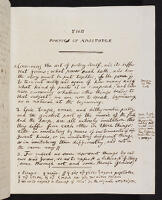The notice is headed ‘Truth stranger than Fiction!’, and the attributes of the horse are described as follows: ‘Fourteen-and-a-half hands high. Fine lofty action, and a splendid walker. Up to any weight or distance. A truly noble and magnificent animal: perfectly sound and without vice. He will also perform several Curious and Remarkable Feats! Will carry a walking-stick: and has been known to stand on two legs for a considerable time during the performance of a piece of music.’ ‘Enquire of G. Sheltie, Loughrigg Cottage, Rydal.’ ‘Printed by John Garnett, Windermere.’
The two pages are marked ‘See Page 34.’, i.e. f. 34r.
